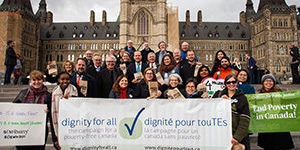Originally published in Canada Lutheran – July/August 2014
How do we restore our covenantal relationship with God and creation?
This was the question put to a gathering of parishioners in the fellowship hall at St. Peter’s Lutheran, Ottawa, on a Sunday morning late in February. Seminarian (and St. Peter’s intern) JoAnne Lam had just preached on the Christian call to care for creation, and about 25 members of the congregation gathered after church to explore how to better live into that calling.
They came to the discussion with questions, an openness to explore, and a readiness to take collective action. And how did they respond to the question before them? In three ways. First, they identified the need to learn more about ecological justice issues, and to share that learning with others. Second, they noted the need to conserve resources and take actions to “green” their homes and church. Third (and this is significant), they spoke of the importance of defending God’s creation and advocating for better environmental policy.
It was fascinating – and encouraging – that learning, greening, and advocating were all identified as necessary actions, because it speaks to the necessity of a holistic approach. Personal and church greening is often perceived as the solution to environmental degradation and climate change. Full stop. It is important, to be sure, but the unfortunate reality is that in terms of carbon emissions, personal and church greening activities are carried out on such a small scale that they have very little impact.
Anglican priest, social worker, and CPJ collaborator, Mishka Lysack eloquently points out that the greatest value of greening activities is that they “create psychological changes in how we see our relationship with creation, and prepare us for the deep social and economic changes that we urgently need to make.”
Now back to St. Peter’s.
Discussion revealed that a number of church practices had set the congregation well on its way to qualifying for the ELCIC’s “Greening Congregation Accreditation Program.” Established in 2007, this program “is intended to encourage congregations to take steps to live out our calling to be stewards of creation and to recognize congregations who show leadership by working to be good stewards of creation in their life together.” Accreditation requires taking action in five of the following eight areas: energy conservation; reduce, reuse and recycle; ground care and maintenance; transportation; church communication; religious education; worship and liturgy; and, environmental justice and advocacy.
Perhaps the key to the group’s initial responses to the covenant question can be found in the denomination’s perspective on creation care – and its explicit inclusion of environmental justice and advocacy. Engaging in calls for government action for the healing of creation is, according to the ELCIC, “a part of the work we do as a church and the responsibility we have as disciples of Christ.”
With that in mind, members of St. Peter’s immediately formed an ad hoc working group on church greening. Before our discussion had come to a close, they had also committed to resolve the church’s recycling issues, make greening and ecological justice resources available to members of the congregation, and to prepare a statement in favour of church greening for presentation to Church Council.
So how is St. Peter’s participating in the restoration of our covenantal relationship with God and creation? They are taking action – as individuals, as Christians, and as citizens.
Karri Munn-Venn is a policy analyst at Citizens for Public Justice – a national organization of members inspired by faith to act for justice in Canadian public policy. Together with intern JoAnne Lam, she facilitated a workshop on “Living Ecological Justice” at St. Peter’s Lutheran Church, Ottawa on February 23, 2014.




